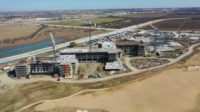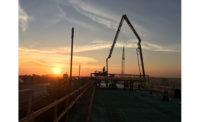As the COVID-19 pandemic continues to change lives daily, the construction industry is continuing to adapt. Across the region, work continues, with strict attention to safety and sanitation protocols.
On April 4, Arkansas Gov. Asa Hutchinson issued an executive order stating that construction companies are permitted to continuing working, but must implement specific social-distancing protocols, including limiting the number of people entering a facility, maintaining 6-ft distances between people, and providing adequate hand sanitizing locations in “appropriate areas.”
The construction industry is still operating in Oklahoma for the moment as well. Governor Kevin Stitt issued an amended executive order on March 24 ordering all businesses not identified as a critical infrastructure sector as defined by the U.S. Department of Homeland Security, and located in 19 counties experiencing COVID-19 spread, to close.
“On March 25, Gov. Stitt issued a more detailed list of critical infrastructure sectors which included construction workers, residential and commercial, and construction support operations,” says Douglas J. Tapp, executive director of AGC Oklahoma.
“Currently the industry is still operating under that amended executive memorandum. We have had reports of projects shutting down due to owner financial concerns, but have not had any reports of projects shutting down due to COVID-19,” Tapp says. “Our AGC member contractors are striving to implement the jobsite COVID-19 safe practices as outlined by the CDC.”
Meanwhile, on March 24, Mississippi Governor Tate Reeves signed an executive order that outlined guidelines to slow the spread of COVID-19 across the state. In that order, Mississippi declared construction essential, says Bob Wilson, executive director of AGC Mississippi.
“There was some confusion because several mayors instituted curfews which was not in the governor’s declaration,” he explains. “The Governor made a more defining statement which said local mayors could impose curfews as long as they did not impede his list of essential services.”
While construction remains ongoing for now, there are some issues with laborers staying home over virus concerns, which has led to labor shortages on some jobsites, Wilson says.
“Although, at this point, construction is considered “essential” as you can see in the governor’s declaration, testing has ramped up which will most likely lead to more cases diagnosed,” Wilson says. “Depending on the rate of increase, the governor wants everyone to understand that the situation is definitely fluid and he could issue shelter at home for more infected areas.”
Louisiana
In Louisiana, construction continues as well. Under the state’s “Stay at Home” order, construction is still classified as essential.
“Our contractors throughout the state are working to ensure that essential services and products are delivered in an environment that embraces safety first and foremost,” says John Walters, vice president of governmental relations for ABC of Louisiana. “The work our member companies are doing around the clock requires extraordinary measures to make sure we keep our workforce healthy and our region and state moving.”
The city of New Orleans, despite being considered a new epicenter for the pandemic, has deemed construction as essential. As a result, businesses and projects related to construction, infrastructure, and maintenance may continue to operate, and employees may continue to commute to and from work, according to the city. However, construction sites must maintain appropriate social distancing measures and all other public health mandates.
"As information surrounding the coronavirus continues to evolve at a rapid pace, ABC of Louisiana member companies are keeping safety at the forefront of every decision they make and will adapt on a case-by-case basis while always following the recommendations issued by CDC and local officials,” Walters says.
Walters adds that ABC of Louisiana member companies have assured employees that they have the right to stop working, without repercussion, if they perceive a situation as unhealthy or unsafe.
Construction work for the U.S. Army Corps of Engineers New Orleans District has been able to move forward with “minimal to no impacts,” but the agency is prepared to act swiftly if needed, says spokesman Ricky Boyett Jr.
“We understand that this status can change quickly under these conditions,” he says. “While keeping the health and safety of our teams at the forefront, we will continue to closely monitor and would seek opportunities to mitigate any schedule impacts if necessary.”
So far, two Corps employees in New Orleans have tested positive for COVID-19, but they received their diagnosis well after the Corps initiated district-wide telework capabilities on March 16, so operations were not affected, Boyett says.
Employees whose jobs require them to come onsite must have their temperature taken before they can enter district headquarters. “As most of our construction work is performed by contractors, we continue to encourage those organizations to adhere to social distance and health guidance as well,” Boyett says.
Meanwhile, the week of March 16, a worker with one of the subcontractors on the $530 million Four Seasons Hotel and private residences project tested positive for COVID-19. As a result, about three-quarters of the approximately 600 workers onsite stopped coming in, Robert Sullivan, senior vice president with AECOM Tishman, told ENR.
On March 31, the team member was feeling better and had returned to work, according to Paul Flower, a member of the project’s development team and CEO of Woodward Design+Build. Staff members who were in close contact with him completed their 14-day quarantine on April 2, and returned to work on April 3.
Work in critical areas, including enclosing the building and completing the central plant is “progressing well,” Flower told ENR. “We felt these were areas where our team could safely work as we continue to learn more about the virus and implement additional safety measures to ensure we take care of our most important stakeholders, our builders,” Flower says. “Slowdowns have mostly been in interior finish areas, where our subcontractors feel they cannot put enough distance between workers to safely complete the job.”
Onsite, the project team has implemented various safety measures, including temperature checks, a shift to a 40-hour/four-day work schedule, hand-washing stations and staggered work times. The team is working with Pomegranate Hospitality, My House Social and Pythian Market to purchase and deliver meals to workers onsite.
Angela O’Byrne, president of design-build firm Perez LLC, issued a mandatory stay-home order for all of the firm's employees, and says other design firms are doing the same. She expects more contractors to follow suit..
“I think more construction companies will shut down field operations – even against the wishes of owners,” she says. “Some of our new projects are on hold and have not kicked off, due to COVID-19. Other projects that we had finished designing and were in the bidding phase got put on hold.” All permitting is taking place online, and Perez reports it is “working more smoothly” than she expected.
The $100 million Clearview City Center, one of the largest retail projects planned for the New Orleans metro area, is continuing to move forward “with very little impact,” the project developer told ENR.
Announced in late 2019, the project would transform the 50-year-old suburban Clearview Mall into an open-air retail development that would blend shopping and dining with upscale apartments and office space. Design plans are well under way and should be complete in the next five to six months. This includes the “full gamut of planning,” from exterior site work all the way to permitting, says Thomas Richards, managing partner of Richards Clearview LLC.
“This is work that can take place while the current restrictions are in place,” Richards says. “Our intent is to continue moving into construction later this year once the worst of this outbreak is behind us, without our project timeline being impacted.”
“We are fortunate in that we already had financing in place and plans were moving forward with the project well before this pandemic, so we were past that important milestone for projects like these,” Richards says.
Texas
Throughout Texas, construction continues to forge ahead. Commercial construction companies have implemented enhanced standards on their own to limit workers on the jobsite, stagger shifts of workers, enhanced washing stations, and limiting trades on jobsites to adhere to self-distancing mandates, explains Meloni Raney, president and CEO of TEXO.
“Each county has issued their own orders when it comes to construction so our industry is adjusting to the ever-changing landscape of the COVID-19 health crisis,” she says.
On March 29, Dallas County Judge Clay Jenkins issued a revised order for the construction industry, clarifying the types of construction allowed to continue, and rules that must be followed on all job sites. The order defines construction for public works, residential, commercial and schools as critical infrastructure. On site rules and requirements include mandatory temperature checks for all workers prior to leaving home, temperature checks before starting work and maintaining a six-foot distance among all workers. Jenkins issued an amended order on April 3, further detailing safety rules for the construction industry.
In Austin, effective March 25, Mayor Steve Adler ordered non-essential business and operations to cease. Public works, affordable housing and critical infrastructure projects were the only types of construction exempt from the order. Travis County also issued their own guidance for the construction industry document that seeks to curtail construction even further than the city, which limits construction for essential projects to only repair/maintenance work, whereas the city language allows new construction for essential projects as well, according to Austin AGC.
However, in response to an executive order issued by Gov. Greg Abbott on March 31 that provided “a uniform statewide approach to certain restrictions and permitted activities in light of the COVID-19 pandemic,” the city of Austin on April 2 issued “supplemental guidance” that allowed all construction activity to once again continue, while also detailing specific health and safety protocols.
Construction has remained ongoing in both Houston and San Antonio.
“Austin and Dallas County have been the most stringent areas on our ability to keep working,” says Joel Stone, chairman/CEO of SpawGlass. “Our mitigation plan is being reevaluated daily. Using social/physical distancing; sanitizing and cleaning our workspaces; and constantly conducting wellness assessments of our team members allows us to keep our worksites safe.”
With 10 offices across the state of Texas, the SpawGlass team has seen a varied and similar response from municipalities and counties, Stone says.
“We are doing health assessments daily to ensure we are not exposing our workforce to the invisible risks of the virus. This is evolving daily as we work to improve the assessments,” he says. “We have also had the immediate need to become procurement specialists of difficult-to-find resources such as masks; cleaning and sanitizing materials; and medical equipment such as thermometers.”
Stone adds that he has seen a few projects stopped, while a few others have started, and others have been put on hold that were scheduled to start.
“Our revenues have been impacted approximately 10-20% in the month of March,” he adds. “Fortunately, we have not had any workers test positive for COVID-19.”
Some specialty contractors have reduced their workforces and even stopped work amid the crisis, Stone adds.
Crews with specialty contractor Byrne Metals are still working, says President Neil P. Byrne.
Byrne notes that because his firm’s backlogs are still solid, he remains relatively optimistic about 2020 revenues. His firm is also taking significant measures to limit the chance of spreading the virus.
“We do a lot of fabrication and installation, and so our shop and field are kind of running as usual,” he says. “We've been very fortunate not to have any impact to our own workforce at the moment.”
Operations in Dallas, Houston and San Antonio are continuing at Rogers-O’Brien Construction.
“Even before a lot of the “stay home, work safe,” orders that were mandated by some of the major counties in Texas, we had put together a task force to list a number of protocols to include on our job sites so that we would a try and continue work as best as possible,” says John Barnes, Houston president at Rogers-O’Brien. “Our theme has been protocol before productivity. [And] that protocol is centered solely around safety.”
The firm has instituted temperature testing on all employees on all projects before entering jobsites, emphasized communication to make sure workers are feeling well before they’re allowed to work, along with other measures such as the six-foot rule.
“Amazingly, a lot of things are on track. Communication's one of our biggest tools in our tool belt right now,” Barnes says. “A lot of our workers are hourly. From that economic standpoint, it's important for us to keep those families going by keeping people working.”
McCarthy Building Cos. recently had a subcontractor employee on a Texas jobsite test positive for COVID-19.
“In accordance with our heightened safety protocols, the area where the worker had been assigned, and the surrounding vicinity, was immediately shut down and sanitized,” explains McCarthy’s Southern Region President Joe Jouvenal. “The workers that the individual came into contact with were sent home to self-quarantine for the 14 days as recommended by the County Health Department where he was diagnosed.”
The firm has not seen any project shut downs in Texas so far, but given the uncertain environment, is continuing to move projects ahead in the safest way possible.
TDIndustries has asked its employees to start taking their temperature before leaving the house as an extra precaution, says Executive Vice President Nikki Morgan. The firm is also making sure every jobsite has had washing stations—even those that don’t have water.
“We're working with distilleries across Texas and in Arizona—they have access to alcohol and so they're starting to make hand sanitizer, which we're trying to buy by the keg,” Morgan says. “We have been on a communication spree over the last three weeks to make sure everybody has as much information as possible.”
TDIndustries has a program called TD Cares, which is an employee-funded program aimed ato assisting staff experiencing a significant financial hardship. The firm’s top 30 leaders unanimously agreed to take a 10% to 20% pay cut to fund that program, Morgan says.
“So as these jobs slow down and as we have less work, hopefully we can keep people as whole as possible with money coming in. We're trying to self-fund to keep people financially sound as long as possible,” she says.





